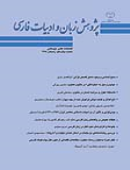نسبت حافظ با مجبره و اشاعره
محورهای موضوعی : پژوهشهای ادبیات کلاسیک ایران
1 -
کلید واژه: حافظ جبر اشاعره تقديرگرايي رندي,
چکیده مقاله :
يكي از مباحث مهم درباره شعر و انديشه حافظ، مبحث جبرگرايي است. گرچه محققان از جنبههاي گوناگون اين مسئله را مطالعه كردهاند؛ اين موضوع نيز مانند بسياري از موضوعات مربوط به حافظ محل مناقشه است. برخي از محققان، جبرانگاري حافظ را تأیید کردهاند، گرچه در اشعريگرایي او اتفاق ندارند؛ بيشتر آنان در اين نكته تأمل كرده و انديشه حافظ را وراي عقيده مجبره و اشاعره ميدانند. در این مقاله ضمن طرح اینگونه دیدگاهها به این نکته توجه شده که موضوع اختلاف اشاعره و معتزله بر سر فعل ارادی انسان است و هر عقیده جبری را نمیتوان دیدگاهی اشعری و حتی مؤمنانه تلقی کرد. سپس نگاه رندانۀ حافظ به جبر مطالعه و با شواهد متعدد از دیوان وي، نشان داده شده که حافظ اینگونه اشعار را در جواب ملامتگرانی آورده که وی را به عشق و رندی متهم میکنند. سرانجام نیز دیدگاه محققانی که با این عقیده همسو هستند مطرح شده است. نتیجۀ پژوهشهای مقاله نشان میدهد که بیشتر ابیات حافظ که ظاهری جبرگرا دارد، در مقام مجادله با ملامتگران و ناظر بر مهمترین ایراد معتزله بر جبرگرایان است. بنابر اين نه تنها جبری و اشعری مسلکبودن حافظ را اثبات نمیکند، بلکه دليلي بر اختلاف فكري حافظ با آنان است.
One of the signifying issues about poetry and thought of Hafez, a Persian poet, is determinism and fatalism. Although a number of researchers have studied this topic from different aspects, it is still, like so many other issues about Hafez, seriously debatable. A part of scholars have stressed on determinism in his poetry, even if they don’t reach to any common point about his being Ash’ari. Most of them have believed in not his being a part of these two schools. In this paper, firstly, a quick review of different standpoints about Hafez’s thought world will put forward. Then the discussion goes through the dissension of Ash’arite and Mu'tazilah schools, which based on the human’s intended or chosen’s act, considering that every deterministic belief is not attributed to Ash’arite or any kind of theological approach. Finally, through focusing on the freethinking behavior of Hafez toward the determinism, based on various examples from his poetry book, it is rendered that these reneges of poems are composed in reply to his reproachers who had charged him with the profligacy and love. At the end, the viewpoint of researchers who believed in determinism of Hafez is negotiated. As a result, most of Hafez’s poems which are apparently in harmony with determinism school, considered as his disputing with the reproachers as well as criticizing Ash’arite and Mu'tazilah in terms of ignoring freedom of choice. To come to the point, being a part of determinism and Ash’rite school not only could not explain Hafez as he is but also is against his disagreement with these schools.


